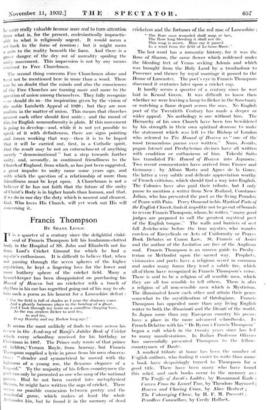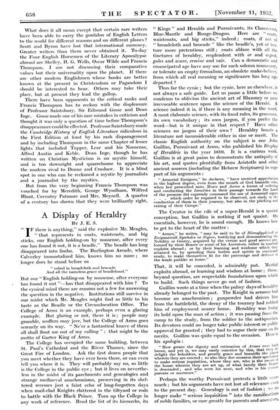Francis Thompson By SHANE LESLIE 1 T is ti quarter
of a century since the delightful child- soul of Francis Thompson left his laudanum-clotted body in the HOspital of SS. John and Elizabeth not far from Lord's Cricket Ground for which he had a mystic's enthusiasm. It is difficult to believe that, when not passing through the seven spheres of the higher mysticism, he kept a lingering love for the lower and more leathery sphere of the cricket field. Many a kennel-keeper has been disappointed .on purchasing his Hound of Heaven but no cricketer with a touch of rhythm in his ear has regretted going out of his way to ob- tain such. a poem as his lament for a Lancashire defeat : For the field is full of shades as I near the shadowy coast. And a ghostly batsman plays to the bowling of a ghost.. And I look through my tears on a soundless clapping boat; As the-ran stealers flicker to and fro,
. to and fro, 0 my Hornby and my Barlow long ago !
It seems. the most unlikely of finds to come across his review in,the Academy of Ranji's Jubilee Book of Cricket which .,every. schoolboy received for his birthday or Christmas in :1897. The Prince only wrote of that prince of fielders;Nernon Royle, from .hearsay, but Francis Thompson-supplied a lyric in prose from his own observa- tion : "slender' and symmetrical he moved with the lightness of a. young roe, the flexuous elegance of a leopard." .To the majority of his fellow-countrymen the poet can only be presented as one who sang of the national games, Had he not been carried into metaphysical themesrhe- might have written the saga of-cricket. There seems no possible -comiexion between poetry and the wonderful , game, which . makes at least the whole Antipodes -kin,. but he found it in the memory of dead cricketers and the-fortunes of.the red rQ.Se.,of Lancashire :
"The Rose once wounded shall snap, at last, - The Rose long bleeding ,it shall not die. • This song is secret. Mine ear it passed In a wind from the field of Le-bone-Marie."
The. last word has a romantic history, for it was the Hose of Sharon, the same flower which reddened under the -bleeding feet of Venus seeking Adonis and which was brought from the Holy Land by a troubadour to Provence and thence by royal marriage it passed to the House of Lancaster. The poet's eye in Francis Thompson discerned it centuries later upon a cricket cap.
. It hardly seems a quarter of a century since he was laid in Kemal Green. It was difficult to know then -whether we were leaving a lamp to flicker in the Sanctuary or watching a flame depart across the seas. No English poet of the Twentieth Century has made at deeper or wider appeal. No anthology is one without him. The Hierarchy of his own Church have been too bewildered by his strength in their own spiritual demesne to make the statement which was left to the Bishop of London who referred to The hound of Heaven as " one of the most tremendous poems ever written." Nuns, Jesuits. pagan laterati and Presbyterian divines have all written with erudition or enthusiasm of him. Takeshi Saito has translated Ths Hound of Heaven into Japanese.
-Two recent commentaries have arrived from France and Gerinany: : by Alfons Martz and Agnes de la Gorce.
the latter a very subtle and delicate appreciation worthy of French criticism, which should find a way into English. The - Colonies have also paid their tribute, but I only pause to mention a writer from New Zealand, Constance Julian, who has presented the poet as the living Paradox of Peace with Pain. Percy Osmond in his Mystical Poets of the English Church, finds it impolitic not to go out of bounds to revere Francis Thompson, whom. he writes, "many good judges are prepared to call the greatest mystical poet of the English tongue." The walls and barriers of sect fall Jericho-wise before the true mystics, who wander careless of Encyclicals or Acts of Uniformity or Prayer Book Debates or Canon Law. St. Francis of Assisi and the author of the Imitation are free of the Anglican soul. Francis Thompson is an unseen guide to Presby- terian or Methodist upon the sacred way. Prophets, visionaries and poets have a religious secret in common and under many forms they tend a subtle fire, which all of them have recognized in Francis Thonipson's verse.
There is said to be a religion of all sensible men, which they are all too sensible to tell others. There is also a religion of all non-sensible men which is Mysticism.
The illuminated know each other and attain their peace somewhat to the mystification of theologians. Francis Thompson has appealed more than any living English writer to both the illuminati and the literati of the world. In Japan more than any European country his poem; have a place in the more advanced schoolbooks. In French Dclattre with his " De Byron i Francis Thompson- began a cult which in the twenty years since has led to many manifestations. In Italian Professor Olivero has successfully presented Thompson to the fellow- countrymen of Dante.
A marked tribute at home has been the number of English authors, who finding it easier to write than name a book have despairingly turned to Thompson for a good title. There have been many who have found this relief, and such books occur to the memory as : The Traffic of .Jacob's Ladder, by Rosamund Earle ; Carven From the Laurel Tree, by Theodore Maynard ; Heaven and Charing Cross, by Alice- Herbert ; The Unhurrying Chase, by II. F. M. - Prescott ; - Beardless Counsellors, by Cecily Hallack. What does it all mean except that certain rare writers have been able to carry the gonfalon of English Letters to the world for different reasons and on different planes ? Scott and Byron have lost that international currency. Greater writers than them never obtained it. To-day the Four English Horsemen of the Literary Apocalypse abroad are Shelley, H. G. Wells, Oscar Wilde and Francis Thompson. I am not discussing their comparative values but their universality upon the planet. If there are other modern Englishmen whose books are better known at the present in Christendom or Pagandom I should be interested to hear. Others may take their place, but at present they lead the gallop.
There have been opponents in the critical ranks and Francis Thompson has to reckon with the displeasure of Professor Saintsbury, Sir Edmund Gosse and. Dean Inge. Gosse made one of his rare mistakes in criticism and thought it was only a question of time before Thompson's disappearance could be effected. Professor Saintsbury made the Cambridge History of English Literature ridiculous in the First Edition at least by his rash disparagement and by including Thompson in the same Chapter of lesser lights that included Tupper, Lear and his Nonsense, Alfred Austin and Keble. Dean Inge, though he has written on Christian Mysticism is no mystic himself, and is too downright and quarrelsome to appreciate the modern rival to Donne and Crashaw. It is a blind spot in one who can be reckoned a mystic by journalists and a journalist by the mystics.
But from the very beginning Francis Thompson was vouched for by Meredith, George Wyndham, Wilfred Blunt, Coventry Patmore and Mrs. Meynell. A quarter of a century has shown that they were brilliantly right.































 Previous page
Previous page